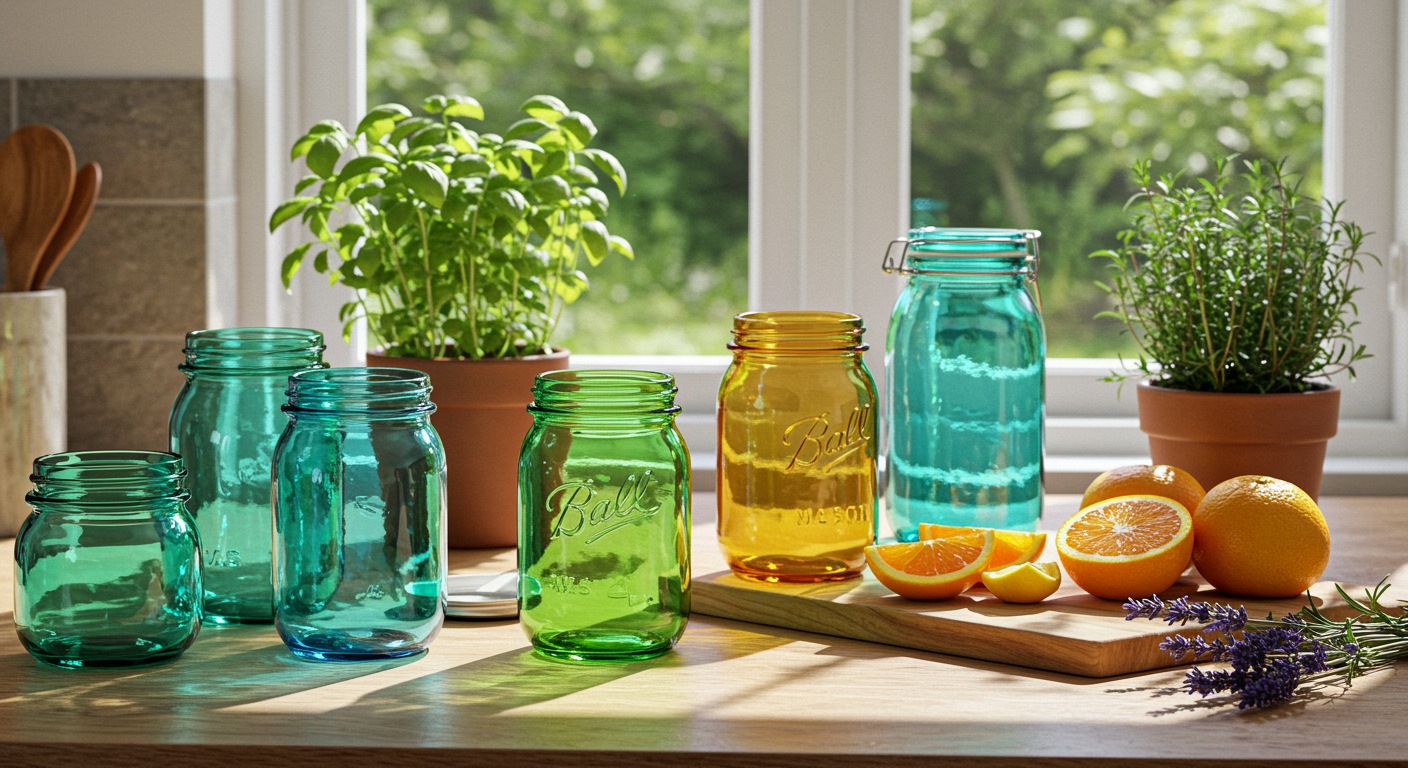Can You Recycle Mason Jars? Things You Need to Know
Yes, you can recycle mason jars. They’re primarily made of glass, which is completely recyclable. Most curbside recycling programs accept them, helping to conserve resources and cut down on waste.
Just be sure to empty and lightly rinse the jars before tossing them in the recycling bin. Remember, reusing mason jars has its perks too, and there are plenty of creative ways to repurpose them. Discover more about their benefits and recycling process.
Key Takeaways
- Yes, mason jars can typically be recycled through most curbside recycling programs, though acceptance may vary by community.
- Ensure jars are emptied and lightly rinsed before recycling; metal lids should be separated from glass jars.
- Intact mason jars are preferred for recycling, as broken glass cannot be recycled curbside.
- Glass is infinitely recyclable, conserving resources and energy while reducing greenhouse gas emissions.
- Participation in recycling mason jars supports a closed-loop production cycle and promotes sustainable practices.
Understanding Mason Jar Materials
Understanding the materials that make up mason jars is essential for appreciating their versatility and sustainability. These jars are primarily crafted from glass, made from lime, silica, and soda, ensuring durability while being recyclable multiple times.
The lids, composed of iron ore and coated with tin, protect the steel beneath. Silicone rubber gaskets create airtight seals, although they can’t be recycled.
While mining these materials has environmental impacts, the energy efficiency of recycling glass surpasses that of producing new glass.
Curbside Recycling Acceptance
Mason jars aren’t only a sustainable choice for storage but are also a great option for curbside recycling.
Most curbside programs accept glass jars, making it easy for you to recycle responsibly. Simply empty and lightly rinse your jars before placing them in the recycling bin. It’s fine to leave the labels on, but separating metal lids is often recommended.
Increased plastic usage leads to higher landfill contributions, making it even more important to recycle glass items like mason jars.
Recycling Process for Glass
Recycling glass, like your trusty mason jars, involves a detailed process that transforms used materials into new products, greatly benefiting the environment.
It all starts with collection from your recycling bin or local community center. After collection, high-tech machines sort the glass, removing non-glass items and separating colors.
Next, the glass is crushed into small pieces, called cullet, ensuring uniformity for further processing. Through screening and cleaning, any remaining contaminants are eliminated.
Additionally, recycling glass conserves energy and raw materials, making it an essential practice for sustainability. Finally, this clean cullet is ready for reuse, melted down, and reshaped into new jars, bottles, or even fiberglass.
Environmental Advantages of Recycling
When you recycle Mason jars, you’re not just clearing out your pantry; you’re also making a significant impact on energy savings and reducing waste. Below are some key environmental benefits of recycling mason jars:
Energy Savings Benefits
Although many people may not realize it, recycling mason jars offers significant energy savings that contribute to a healthier environment.
Here are a few key benefits of recycling:
- Recycling glass uses less energy compared to making new glass.
- Glass can be recycled infinitely, ensuring ongoing energy conservation.
- One ton of recycled plastic saves 5,774 kilowatt-hours of energy.
- Efficient sorting and reducing contamination boost energy savings. Additionally, mason jars’ reuse potential indicates that nearly 95% of them are likely to be reused, further enhancing their environmental benefits.
Waste Reduction Impact
Recycling mason jars plays an essential role in reducing waste and protecting our environment. When you recycle these durable glass containers, you help decrease the amount of waste that ends up in landfills.
This not only minimizes pollution but also cuts down on the energy needed to produce new glass, reducing greenhouse gas emissions. Recycling transforms discarded materials into new products, conserving virgin resources.
Resource Conservation Importance
By choosing to recycle mason jars, you’re not just reducing waste; you’re also playing an essential role in conserving valuable resources.
Consider these benefits:
- Resource Savings: Recycling glass saves over a ton of natural resources for every ton recycled.
- Energy Efficiency: Using recycled glass reduces energy needs, saving enough energy to light a bulb for hours.
- Closed-Loop System: Glass recycling is a closed-loop process with no harmful by-products, which helps reduce carbon dioxide emissions.
- Indefinite Recyclability: Glass can be recycled endlessly without losing quality.
Each mason jar you recycle contributes to a healthier planet, helping to reduce pollution and conserve energy.
Industrial Applications of Recycled Glass
As industries seek sustainable solutions, the use of recycled glass in various applications is gaining traction.
You might be surprised to learn that recycled glass plays an essential role in glass container manufacturing, greatly reducing raw material needs and conserving energy.
Additionally, it significantly contributes to resource conservation by reducing the demand for raw materials like sand and limestone.
It’s also transformed into fiberglass for insulation and construction materials, providing vital reinforcement. Additionally, ground recycled glass serves as an eco-friendly alternative in sandblasting and is mixed with asphalt for durable road surfaces.
Creative Ways to Repurpose Mason Jars
Mason jars aren’t just for preserving fruits and vegetables; they’re incredibly versatile and can be transformed into a variety of creative and functional items around your home.
Here are some exciting ideas to get you started:
- Vases and Decorations: Fill them with flowers or decorative items like sand and seashells.
- Soap Dispensers: Convert them easily by fitting a soap pump into the lid.
- Mini Planters: Grow herbs or small plants for your indoor garden. They also make great upcycled mason jar planters that enhance your home’s aesthetic.
- Candle Holders: Create unique candle holders or lanterns for outdoor settings.
Frequently Asked Questions
Can I Recycle Mason Jars With Labels Still Attached?
Yes, you can recycle mason jars with labels still attached in many curbside programs. Most facilities accept glass jars regardless of label presence, making it easier for you. Just make sure the jars are clean and free from cracks.
While some programs prefer labels removed, many don’t require it. By recycling, you’re helping reduce waste and conserve resources, so don’t hesitate to toss those labeled jars into your recycling bin.
Are Colored Mason Jars Recyclable?
If you’ve got a beautiful blue mason jar leftover from a summer party, you might wonder about its recyclability. Colored mason jars can be trickier to recycle than clear ones. Many facilities accept them, but some might require separate sorting due to color.
What Should I Do With Cracked Mason Jars?
If you’ve got cracked mason jars, don’t toss them! You can repurpose them creatively. Use them for storing dry goods like oats or spices, or transform them into unique vases or candle holders.
They can also organize your desk supplies or serve as decorative pieces filled with buttons. Just remember, avoid using them for food due to safety concerns. Embrace their imperfections and let your creativity shine!
How Should I Clean Mason Jars Before Recycling?
To clean mason jars before recycling, start by emptying them completely and giving them a quick rinse with water. Scrape off any stubborn food residue with a spatula, then let the jars dry.
Remember, you don’t need dish soap; just water will do. Removing the lids and labels will also help guarantee a smoother recycling process.
Recycle Mason Jars and Make a Sustainable Impact
In the grand scheme of things, recycling mason jars is a win-win. By understanding their materials and the recycling process, you can make informed choices that benefit the environment.
Plus, reusing these versatile jars opens up a world of creative possibilities. So, whether you choose to recycle or repurpose, you’re not just clearing clutter—you’re doing your part to reduce waste and promote sustainability. Let’s turn those jars into treasures instead of trash.







